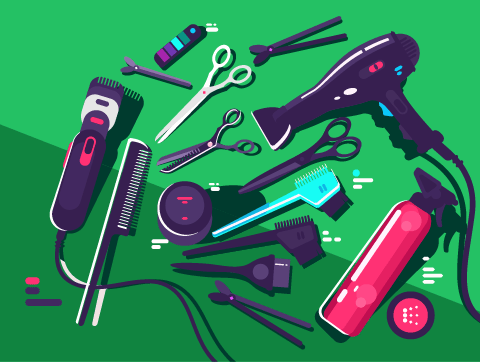Introduction
In the UK, there is something called the Standard Industrial Classification (SIC). This provides over 600 different SIC codes, each defining a different type of business.
So, there are a lot of different types of businesses you could set up.
We need to be able to innovate ideas that are realistic and within our available budget.
In this lesson, we’ll learn about:
- General research for innovative business ideas
- Some specific business types or sectors you can choose from

General Research for Business Ideas
To start off, here is a general principle for you to keep in mind.
All the possible micro-enterprise ideas you look at are likely to fall into one of two categories:
- Something that involves selling your time, or
- Something that involves selling stuff
By this, I mean if, for example, your enterprise is car valeting or hairdressing, people are buying your time. They want you to do something for them and will pay you to spend your time doing it; you are selling them a service.
If your enterprise sells tangible things like car valeting kits or hairdressing products, you are selling tangible goods. Even if you make the stuff, you are selling yourself, and your customers are still buying your products, not your time.

General Research for Business Ideas
The big implication of this is that the number of hours in the day and day in the week is fixed, which puts an upper limit on the amount of money you can make.
This must be factored into your business plan; the hourly rate you charge must be high enough to cover your costs and make a profit.
Remember, as well, you can’t sell every hour of your time.
Your enterprise will involve you in admin and other tasks which you can’t charge to anybody.
If you are selling products made by somebody else, you don’t have the same restrictions. If you get more orders, you just ask your supplier for more products.

General Research for Business Ideas
It is worth doing a few general searches for micro-enterprise ideas, a sort of online ‘brainstorming’.
Search for ‘SIC codes UK gov’, and this will bring up a page on the gov.uk website.
Partway down the page, you will see a heading for “Condensed SIC list in CSV format.” Click the ‘View online’ link to view all 600+ industry codes.
Do some more general searches as well. “Types of new business idea” brings up lots of useful resources; like “100 business ideas you can start today” from the entrepreneurhandbook.co.uk website.
Finally, it is worth repeating the point from the previous lesson; make sure your business idea is realistic.

Business Sectors You Could Consider
Remember what we said in the previous lesson about brainstorming.
Don’t be too quick to dismiss ideas without thinking about them first; one idea might ‘spark’ an idea for a different opportunity.
We’ll now look at some of the sectors you could innovate a business idea in and suggest some possible areas you could look at within each sector.
It is essential that whatever idea you take forward for your micro-enterprise is thoroughly supported by the research you do.
You need to demonstrate to the examiner that you have thoroughly researched your ideas and reached your decision based on sound business reasons, not just because you like the sound of something or because it involves doing something you enjoy.

Business Sectors You Could Consider
Animals & Horticulture
Dog walking; dog grooming; breeding fish; supplying pet and animal care products; gardening and landscaping services; growing plants to sell; selling gardening products.
Art & Design
Creating and selling art; commercial design (logos, posters, websites, etc.); photography (portraits, weddings, pets); videography (weddings, corporate videos); interior design; and garden design.
Cleaning & Maintenance
House and office cleaning; garden maintenance; rubbish clearance; car washing and valeting; window cleaning.

Business Sectors You Could Consider
Creative & Speciality Crafts
Practical products for the home, garden or office; products people might buy as presents or for special occasions like weddings; craft kits for people to make their own craft items and presents; online courses showing people how to make things.
Entertainment, Performing Arts & Leisure
DJ; entertaining children; tour guide; providing technical services to small theatres and theatre groups or acting schools; monetising online services like podcasts, blogs, or a YouTube channel.
Fashion & Accessories
Fashion design; designing, producing and selling small fashion accessories; sourcing and selling unusual fashion items; personal shopper.

Business Sectors You Could Consider
Food & Drink
Opening up a pop-up cafe; catering for parties and other events; creating a unique food product to sell direct to customers or to local cafes, growing and selling fresh produce.
Hair & Beauty
Mobile hairdressing or barbershop; beauty consulting; nail bar; sourcing and selling beauty and hair care products to end-users or to other businesses;
Holding/Hosting Events
Organising events like wedding fairs, open days, conferences; managing venues; arranging seminars and business events; taking bookings; wedding and party planning.

Business Sectors You Could Consider
Mental Health & Wellbeing
This covers a wide range of possible business ideas, including massage therapy and aromatherapy.
Remember the distinction I made earlier about selling your time and making and selling or re-selling products? There are many potential products that fit into the health and well-being category, including essential oils, bath salts, homoeopathic and herbal products, and natural beauty products.
Sport & Exercise
Sports and exercise classes (online and offline exercise); mobile classes (for example exercise classes in retirement homes or football clinics in schools); pitching a business idea to a local football, rugby of cricket club for something you think they need.

Business Sectors You Could Consider
Sustainable & Environmental
Recycling and/or upcycling furniture – for example, converting an old door into a new dining table, bicycles, hand tools and garden equipment, and clothing.
There are lots of companies making money recycling unusual stuff; for example, recycling waste coffee grounds from countless coffee shops to make logs for wood-burning stoves.
Teaching, Education & Coaching
Learning languages, musical instruments, using software, sports and physical activities, gardening, making things, photography, cookery as well as all the academic subjects you learn in school.
Remember that teaching and education come in many forms—online, face-to-face, one-to-one, in a classroom, by video, audio/podcast, and written word.

Business Sectors You Could Consider
Technological, Digital, Social media & E-commerce
E-commerce (selling online) is massive, either selling directly to customers or through online marketplaces like Etsy and Amazon.
Can you think of any opportunities around website design, online content production, or managing social media channels for businesses that you could turn into a micro-enterprise?
Writing and Publishing
Writing and selling your own written content or using your knowledge and expertise in technology to publish other people’s material.
Companies also pay for writers to help write important presentations, text for websites and brochures, social media posts, press releases and articles to send to the media.

Lesson Summary
When innovating business ideas, it’s worth remembering that they generally fall into two categories: selling your time (services) and selling your stuff (goods).
It’s worth researching different types of businesses online to help come up with ideas.
The business sectors you could consider include animals & horticulture, art & design, cleaning & maintenance, creativity & speciality crafts, entertainment, performing arts & leisure, fashion & accessories, food & drink, hair & beauty, holding/hosting events, mental health & wellbeing, sports & exercise, sustainable & environmental, teaching, education & coaching or writing & publishing.
